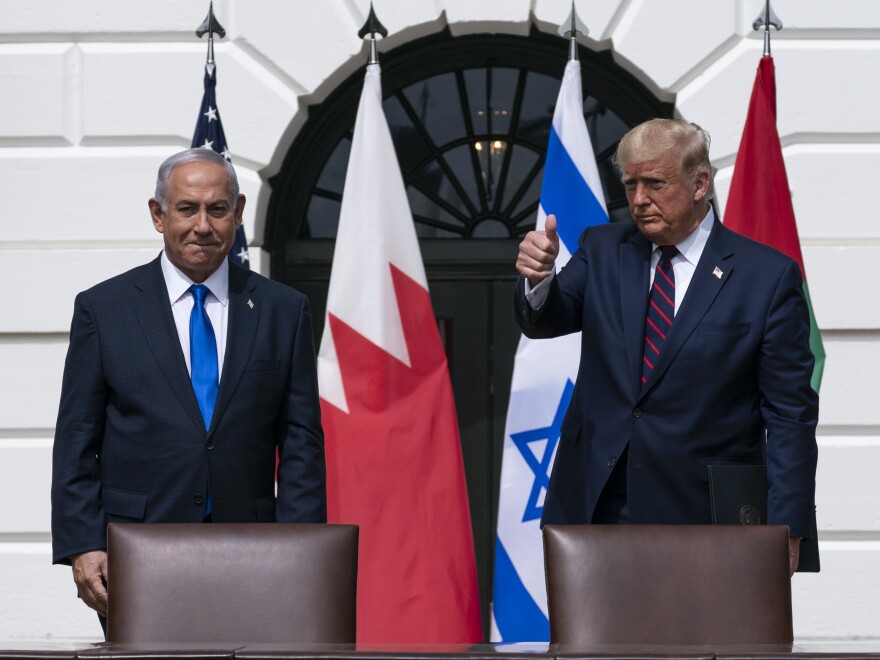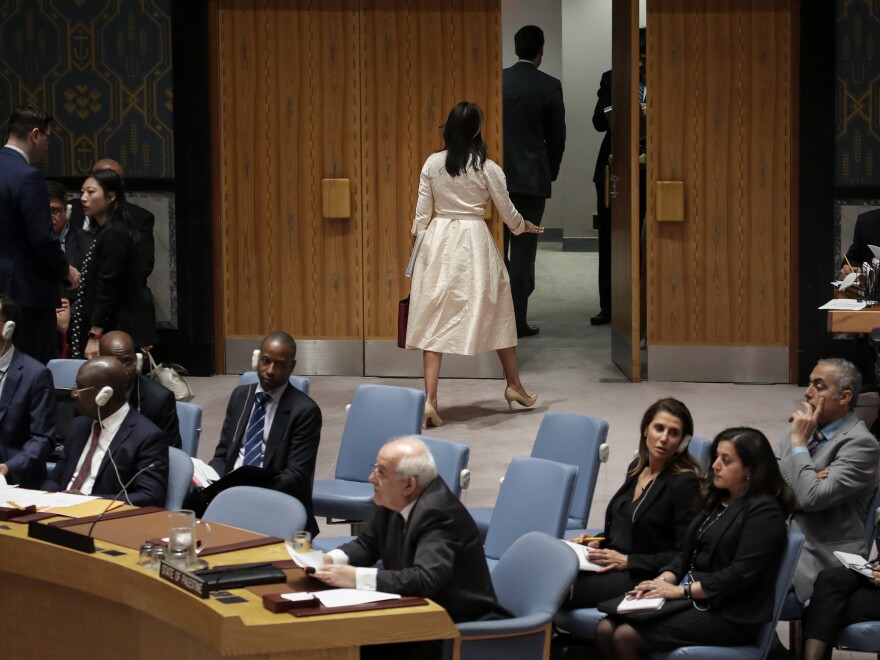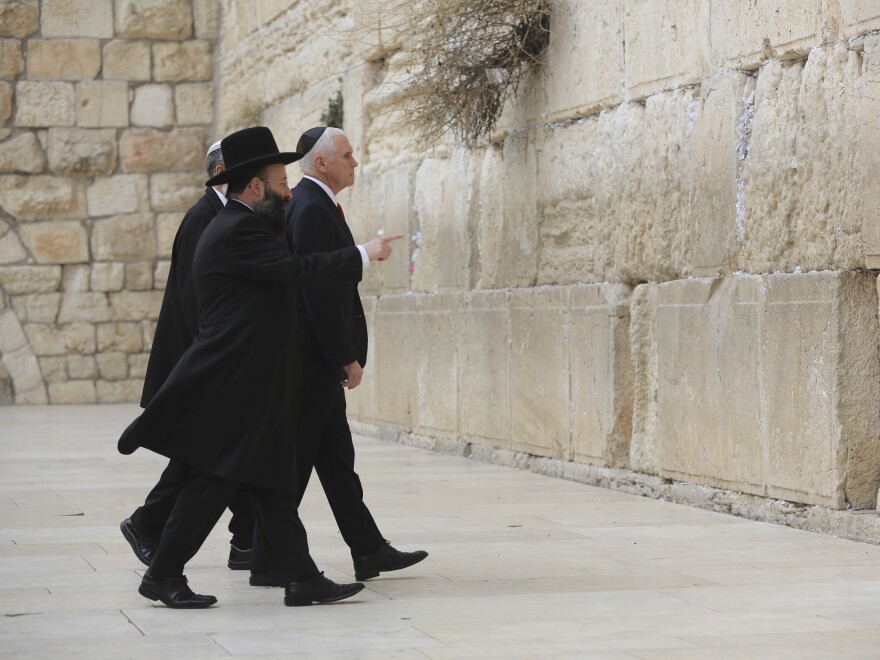It's the day of President Biden's trip to Israel — his strongest show of support for the country yet in its war against Hamas.
"We'll make sure Israel has what it needs to take care of itself," Biden said last week.
The trip, which comes as Israel prepares for a ground counterattack in Gaza, will give Biden the chance to meet with Israeli leaders and discuss growing humanitarian concerns in Gaza.
Since Hamas attacked Israel on Oct. 7, more than 1,400 Israelis and at least 3,000 Palestinians have died because of the conflict. Officials in Gaza say nearly two-thirds of Palestinians killed are children, and that the toll on the Palestinian side is likely to increase after an explosion hit a hospital in Gaza Tuesday.
Republicans seeking Biden's office are closely watching his steps, as his approach to the war gives them a chance to contrast with the president, who's running for re-election, on an issue that is key to GOP foreign policy.
While people in both political parties have decried the attacks as horrific, the war has revealed a deep split among Republican presidential hopefuls in particular as they disagree over whether the U.S. should practice isolationism in its foreign affairs, or take on a more interventionist approach.
Here's where the candidates stand:
Donald Trump
In a recent speech to his supporters, the former president criticized Israeli Prime Minister Benjamin Netanyahu for not being "prepared" for the attack. He then separately complimented Hezbollah, the anti-Israel militant and political organization that operates to Israel's north in Lebanon, calling it "very smart" for its intelligence capabilities.
Several in his party have criticized him over those comments: Florida Gov. Ron DeSantis called his statements "absurd," and his former second in command, former Vice President Mike Pence, described them as "reckless and irresponsible."

But in later remarks, Trump clarified that he stands with Israel. He also said he favors continuing a freeze on refugees from entering the U.S., which would include those coming from Gaza. Trump bristled at the idea of admitting Palestinian refugees and said he'd also ban those who support Hamas, or are a "communist, Marxist or fascist," from entering.
"If you want to abolish the state of Israel, you're disqualified," he said.
Ron DeSantis
DeSantis, a distant runner-up to Trump in national polling, said Israel should use "overwhelming force" so that "Hamas terrorist infrastructure and networks are eradicated from the Earth."
But as for U.S. involvement, DeSantis said he only favors supplementary aid for Israel, and opposes deploying troops to the Middle East.
DeSantis argued that the U.S. should not accept Palestinians fleeing the region as refugees.
"If you look at how they behave — not all of them are Hamas, but they are all antisemitic, " he said. "None of them believe in Israel's right to exist. None of the Arab states are willing to take any of them," he told voters in Iowa.
While speaking with one voter in New Hampshire about the conflict, DeSantis said, "Why aren't these Arab countries willing to absorb some of the Palestinian Arabs?"
After the voter, who said he is Arab American, exchanged more conversation with DeSantis, he told the candidate, "You had my vote, but you don't now."
Nikki Haley
Haley made it her mission while she was Trump's ambassador to the United Nations to staunchly defend Israel. She said the U.S. must stand with Israel as they "finish" Hamas.
She's also criticized DeSantis for claiming that all Palestinians are antisemitic.
"There are so many of these people who want to be free from this terrorist rule," she said in an interview with CNN's "State of the Union."
"They want to be free from all of that," she said. "And America has always been sympathetic to the fact that you can separate civilians from terrorists."
Some joked that Haley was a second ambassador for Israel during her tenure at the U.N. She stopped the appointment of a Palestinian envoy, and claimed that she helped cut out language from a U.S. report that said Israel's treatment of Palestinians is "apartheid." When Israeli forces killed more than 50 Palestinians in 2018, Haley defended the country and even walked out of a Security Council meeting when a permanent observer of the Palestinian territories to the U.N. began speaking about those killings in Gaza.

In August, she fought back against competitor Vivek Ramaswamy when he suggested the U.S. gradually reduce its military aid to Israel. Since 2009, the U.S. has given Israel $3.4 billion in missile defense funding, which includes $1.3 billion just for the Iron Dome, its air-defense system, since 2011.
One of the last steps she took as ambassador before she stepped down in 2018 was to prompt a U.N. vote that, if passed, would have condemned actions by Hamas, though that vote failed.
Mike Pence
In an interview with Fox News, the former vice president said Israel has "no choice but to crush Hamas."
"We will stand with Israel when this ground assault begins, and we will stand with Israel every day through the hard fighting and loss that will occur until they achieve an outright victory," Pence said.
Pence placed blame on the Bush administration for turning Gaza "over to Hamas" and called that policy of "containment" a "catastrophic failure." He also criticized the Biden administration's position on Iran and claimed it laid the groundwork for Hamas's attack on Israel.

Pence said that if he were president, he would tell leaders in Egypt to accept Palestinian refugees: "Send us the bill. We'll set up the refugee camps," he told Fox News. He also said he would direct U.S. forces into the Mediterranean as a message to Hamas allies Hezbollah, and those in Syria and Iran that "all of them are to stand down." He also said U.S. special forces should go into the region to rescue American hostages.
Vivek Ramaswamy
The entrepreneur is one of the loudest advocates in the field for American isolationism in foreign policy. He's extended that stance to Israel, saying that the U.S. should phase out aid for Israel.
While Ramaswamy condemned what he called a "barbaric" and "medieval" attack from Hamas, he said the U.S. should avoid a "knee-jerk response" and take a "cool-headed" approach in Gaza so that the war doesn't grow into a larger conflict in the Middle East.
"We do support Israel," Ramaswamy said. "Israel needs to define its objectives before we know what that support even entails. But I do think it's going to take somebody who gets to the facts rather than just the emotional hysteria that we're seeing from some of the other candidates."
Chris Christie
The former New Jersey governor alleged on X that Biden's strategy of so-called appeasement "invited" the attack on Israel.
Biden’s appeasement of Israel’s enemies has invited this war against Israel. Appeasement anywhere never works. We must do whatever it takes to support the State of Israel in its time of grave danger, and we must end the scourge of Iran-backed terrorism. This terrorism is funded…
— Chris Christie (@GovChristie) October 7, 2023
"Under my presidency, America will restore the deterrence Biden has foolishly given away," he said.
In an interview, Christie blasted Trump for praising Hezbollah. "Only a fool would give comments that could give aid and comfort to Israel's adversary in this situation," Christie said.
Tim Scott
The South Carolina senator has stressed the long-term alliance between the U.S. and Israel, and supported Netanyahu's "restraint" in the war thus far.
"Americans should stand shoulder-to-shoulder, back-to-back, with no daylight with Israel," Scott said of the Israel-Hamas war.
Scott said he believes the U.S. should bring military capacities into the region so that they can "be responsive" if the conflict grows. He, like Pence, added that special forces should be ready to rescue American hostages.
Doug Burgum
In a statement last week, Burgum called the Hamas attack "reprehensible." The governor of North Dakota was one of 20 governors, including DeSantis, who wrote a letter to the White House expressing support for Israel, while denouncing what they claim is the Biden administration's "appeasement-first foreign policy."
The letter claims that Biden's response has empowered Iran and allowed "state-sponsors of terror" to attack Israel.
Burgum expanded on these claims during an event at the Hudson Institute, a conservative think tank. "Hamas is a proxy of Iran," he said. "This is Iran's war on Israel and it's a war on America."
Jake Sullivan, Biden's national security advisor, said the U.S. can't confirm at the moment if Iran knew about the attack beforehand or if it helped Hamas plan it.
Copyright 2023 NPR. To see more, visit https://www.npr.org.



